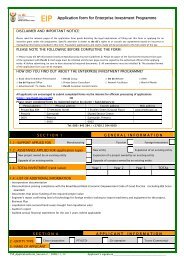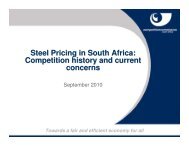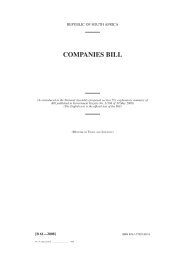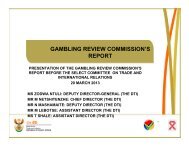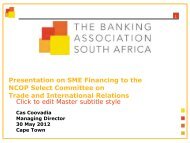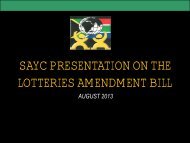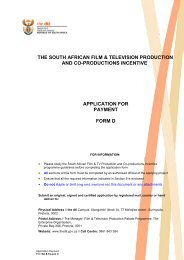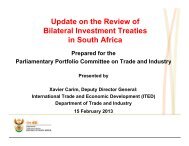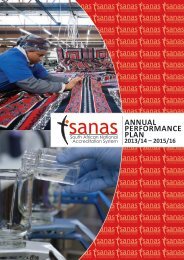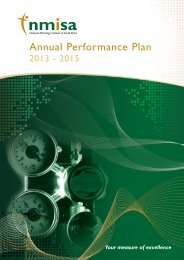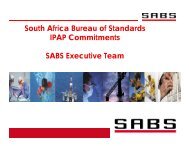Copyright Review Commission Report - ICT Law and Regulation ...
Copyright Review Commission Report - ICT Law and Regulation ...
Copyright Review Commission Report - ICT Law and Regulation ...
- No tags were found...
Create successful ePaper yourself
Turn your PDF publications into a flip-book with our unique Google optimized e-Paper software.
4.2.12. The exclusive right in Section 9 (e) of ‘communicating the sound recording to the public’ was inserted into the<strong>Copyright</strong> Act by the <strong>Copyright</strong> Amendment Act 9 of 2002. The phrase ‘communicating to the public’ is neitherdefined in the <strong>Copyright</strong> Act nor the Performers Protection Act. At first blush, it would seem that South Africahad adopted the ‘making available’ right expounded in the WPPT for sound recordings <strong>and</strong> fixed performances.However, Section 9 A makes a cross-reference to Section 9 (e) <strong>and</strong> clearly states that no one may ‘play’ asound recording as contemplated in Section 9 (e) without the paying of a royalty. The exclusive right is thuslimited to the playing of a sound recording in public.4.2.13. South Africa has, however, partially implemented the prohibition on the circumvention of TPMs. Section 86 ofthe Electronic Communications <strong>and</strong> Transactions Act 25 of 2002 (ECT Act) creates a new cyber-offence relatingto the unauthorised access to, interception of or interference with data. Section 86 prohibits the manufacture orpossession of an anti-circumvention device or the use of such a device to circumvent security measures. Theanti-circumvention prohibition is not copyright-specific <strong>and</strong> applies to all data. The negative aspect of this partialimplementation is that it disturbs the balance of public <strong>and</strong> private rights. These provisions of the ECT Act couldpotentially limit the public domain <strong>and</strong> undermine copyright exceptions <strong>and</strong> limitations as the provisions of theECT Act apply to common law <strong>and</strong> statutory law alike.4.2.14. It is clear that South African copyright law lags behind in the digital era. It does not grant copyright owners acommunication or ‘making available’ right. The Performers’ Protection Act grants performers neither the ‘makingavailable’ right nor any moral rights. Collecting societies are consequently not able to collect royalties wherethird parties make sound recordings available to the public in an interactive manner. Performers <strong>and</strong> producersof sound recordings are accordingly deprived of an important source of revenue by the outdated <strong>Copyright</strong> Act<strong>and</strong> Performers’ Protection Act.4.2.15. The law should be amended to provide copyright owners with the right to control the communication of theirworks to the public.4.2.16. The amendment of the <strong>Copyright</strong> Act will enable copyright owners to reap the full benefits of the new digitalstreams of revenue. In addition, the CRC is of the opinion that the drafters of the provisions relating to themanagement of rights information <strong>and</strong> the anti-circumvention prohibitions should be mindful of users’ rights tohave access to works. The adoption of anti-circumvention legislation should strive to create a balance betweenprivate <strong>and</strong> public rights.4.3 THE ROLE OF MOBILE CONTENT PROVIDERS4.3.1. The Wireless Application Service Provider Association (WASPA) is a self-regulating body that was established in2004 <strong>and</strong> has more than 250 members.4.3.2. WASPA membership has been made compulsory by the Mobile Network Operators (MNOs), namely Vodacom,MTN, Cell C <strong>and</strong> 8ta. The MNOs are not members of WASPA, even though they may offer value-added services.4.3.3. In 2000, Wireless Application Service Providers (WASPs) started selling mobile content <strong>and</strong>, specifically, theoffering of music in the form of polyphonic ringtone downloads for cellular phones. Only mechanical rights werepayable in respect of music <strong>and</strong> literary works as WASPs were selling monophonic <strong>and</strong> polyphonic ringtones.- 31 -



